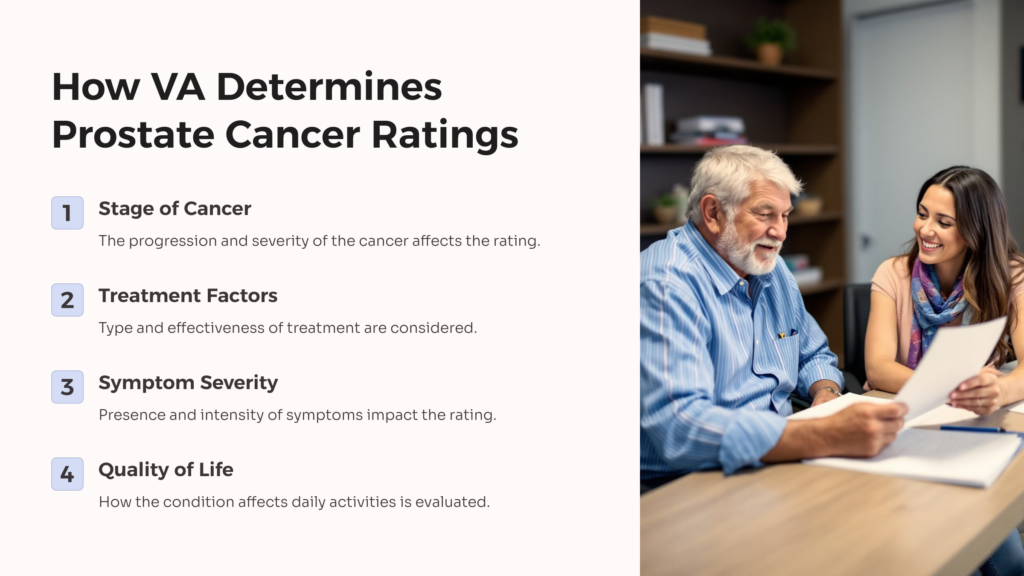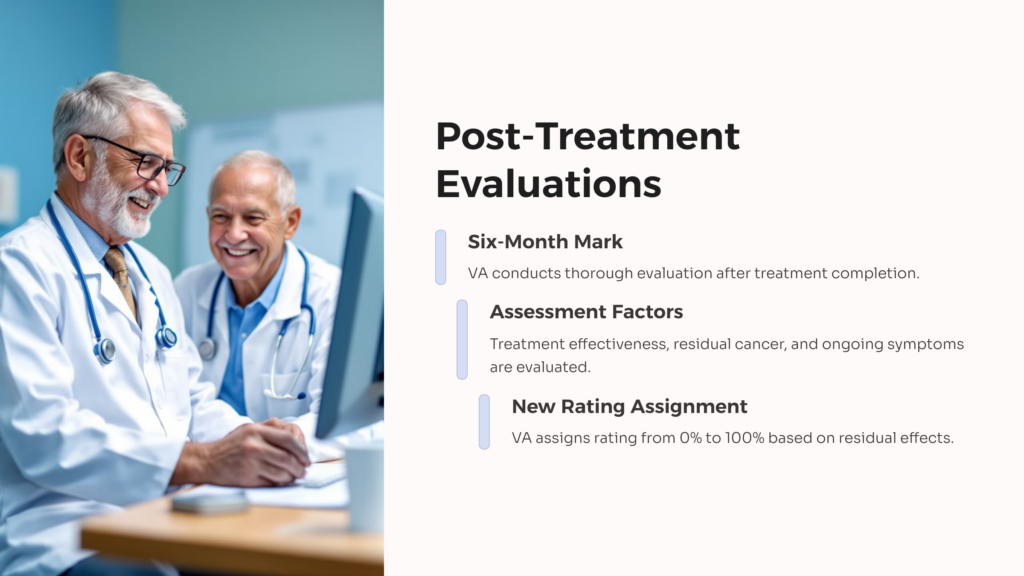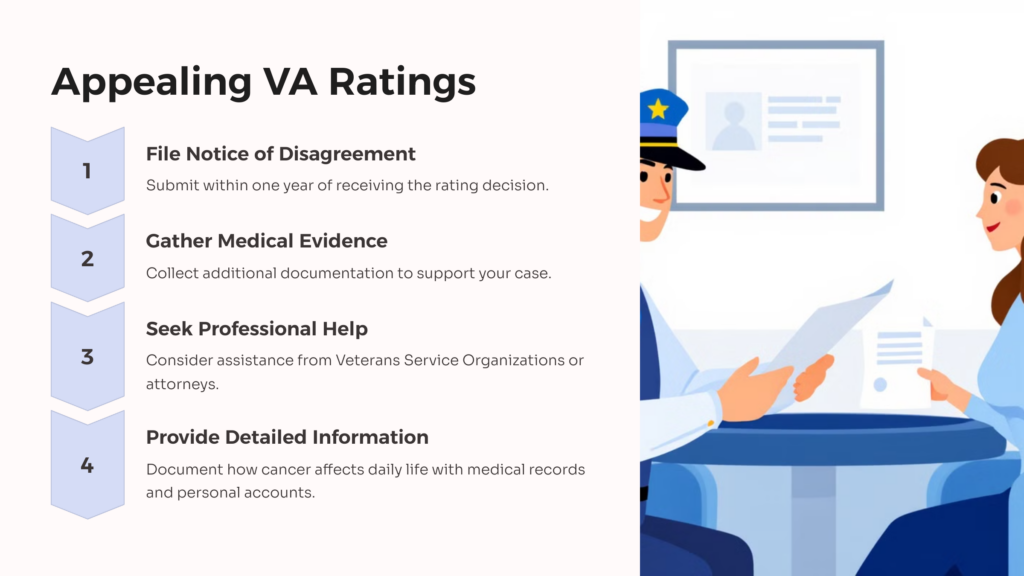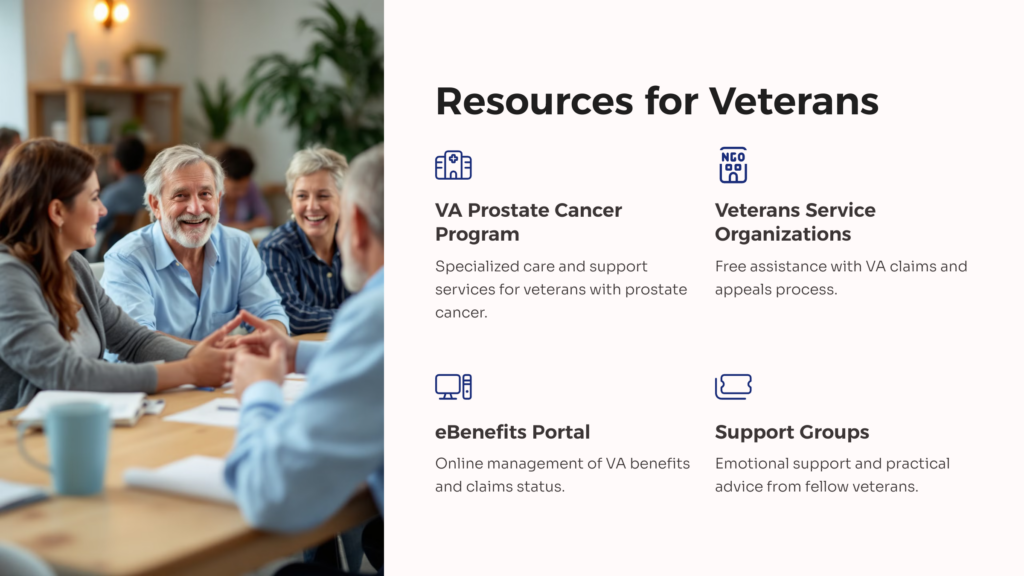Prostate cancer is a serious health concern for many veterans. The Department of Veterans Affairs (VA) provides disability benefits for those affected by this condition. Understanding how the VA rates prostate cancer is crucial for veterans seeking compensation and support.
VA ratings for prostate cancer are based on the severity of the condition and its impact on daily life. These ratings can range from 0% to 100%, with higher percentages indicating more severe cases and greater disability. The rating system aims to provide fair compensation and necessary medical care for veterans dealing with prostate cancer.
It’s important to note that VA ratings can change over time. As prostate cancer progresses or improves with treatment, the VA may adjust the rating accordingly. This ensures that veterans receive appropriate VA disability benefits throughout their journey with the disease.
How the VA Determines Prostate Cancer Ratings

The VA rating for prostate cancer is determined with specific criteria. These criteria are outlined in the VA’s Schedule for Rating Disabilities, which provides guidelines for assessing various health conditions.
For prostate cancer, the VA considers several factors:
- The stage of cancer
- The type and effectiveness of treatment
- The presence and severity of symptoms
- The impact on daily activities and quality of life
Initially, when a veteran is diagnosed with active prostate cancer, the VA typically assigns a 100% disability rating. This high rating reflects the serious nature of the condition and the need for immediate treatment.
After treatment, the VA will re-evaluate the veteran’s condition. This usually happens about six months after the completion of prostate cancer treatment. The new rating will depend on the residual effects of the cancer and any ongoing symptoms or complications.
Initial 100% Rating for Active Prostate Cancer
When a veteran is first diagnosed with prostate cancer, the VA typically assigns a 100% disability rating. This high rating acknowledges the severity of the diagnosis and the immediate need for treatment.
The 100% rating is generally maintained for a specific period:
- During active treatment (such as surgery, radiation, or chemotherapy)
- For six months following the completion of treatment
This period allows veterans to focus on their health and recovery without financial stress. It’s a crucial time when veterans should document all symptoms, treatments, and their effects on daily life.
After the initial treatment period, the VA will schedule a follow-up examination. This exam helps determine the ongoing effects of the cancer and its treatment, which will influence the next VA disability rating.
Post-Treatment Ratings and Evaluations

After the initial treatment period, the VA conducts a thorough evaluation to reassess the veteran’s condition. This evaluation typically occurs about six months after the completion of treatment.
During this evaluation, the VA considers several factors:
- The effectiveness of the treatment
- Any residual cancer
- Ongoing symptoms or side effects
- The impact on daily activities and quality of life
Based on these factors, the VA will assign a new disability rating. This rating can range from 0% to 100%, depending on the severity of the residual effects.
It’s important for veterans to be prepared for this evaluation. Keeping detailed records of symptoms, treatment side effects, and how the condition affects daily life can help ensure an accurate rating.
Common Residual Effects and Their Ratings
Prostate cancer and its treatment can lead to various long-term effects. The VA considers these residual effects when determining disability ratings. Some common issues include:
- Urinary incontinence
- Erectile dysfunction
- Bowel problems
- Hormone therapy side effects
Urinary incontinence is often rated based on the need for absorbent materials. For example:
- Changing absorbent materials 2-4 times per day may warrant a 40% rating
- Changing absorbent materials more than 4 times per day could lead to a 60% rating
Erectile dysfunction is usually rated at 0%, but may qualify for special monthly compensation. Bowel problems and hormone therapy side effects are evaluated based on their severity and impact on daily life.
Appealing VA Ratings for Prostate Cancer

If a veteran disagrees with their VA rating for prostate cancer, they have the right to appeal. The appeals process allows veterans to present additional evidence and argue for a higher rating.
To appeal a VA disability rating:
- File a Notice of Disagreement within one year of receiving the rating decision
- Gather additional medical evidence to support your case
- Consider seeking help from a Veterans Service Organization or attorney
During the appeal, it’s crucial to provide detailed information about how prostate cancer and its treatment affect daily life. This can include medical records, statements from doctors, and personal accounts of limitations and symptoms.
Remember, the appeal process can be complex and time-consuming. Patience and persistence are key when seeking a fair rating for prostate cancer-related disability.
Special Monthly Compensation for Prostate Cancer
In addition to standard disability ratings, veterans with prostate cancer may be eligible for Special Monthly Compensation (SMC). SMC provides additional financial support for specific service-connected disabilities.
For prostate cancer, SMC may be awarded for:
- Loss of use of a creative organ (due to erectile dysfunction)
- The need for regular aid and attendance
- Being housebound due to severe disability
SMC rates are separate from and in addition to the regular disability compensation. They’re designed to help veterans cope with severe limitations caused by their condition.
To receive SMC, veterans typically need to apply separately or have their eligibility determined during the rating process. It’s important to discuss SMC eligibility with a VA representative or veterans service officer.
Maintaining and Updating Your VA Rating
VA ratings for prostate cancer aren’t always permanent. They can change based on the progression of the disease or improvements in your condition. It’s important for veterans to stay engaged with their VA healthcare and benefits.
Regular check-ups and follow-up appointments are crucial. These visits allow doctors to monitor your condition and provide updated information to the VA. If your symptoms worsen, you may be eligible for an increased rating.
On the other hand, if your condition improves significantly, the VA may reduce your rating. However, they must provide notice and give you a chance to submit evidence before making any reductions.
Remember to:
- Attend all scheduled VA examinations
- Keep detailed records of your symptoms and how they affect daily life
- Report any changes in your condition to your VA healthcare provider
By staying proactive, you can ensure that your VA rating accurately reflects your current health status and needs.
Resources for Veterans with Prostate Cancer

Navigating VA disability benefits for prostate cancer can be challenging. Fortunately, there are resources available to help veterans understand and access their benefits:
- VA Prostate Cancer Program: Offers specialized care and support for veterans with prostate cancer
- Veterans Service Organizations (VSOs): Provide free assistance with VA claims and appeals
- VA’s eBenefits portal: Allows veterans to manage their benefits online
- Local VA Medical Centers: Offer healthcare services and can provide information about benefits
Additionally, support groups for veterans with prostate cancer can provide valuable emotional support and practical advice. Many of these groups are available both in-person and online.
Remember, you’re not alone in this journey. Reach out to these resources for help in understanding your VA rating and accessing the benefits you’ve earned through your service.
AllVeteran Can Help
Understanding VA ratings for prostate cancer is crucial for veterans seeking proper compensation and care. From the initial 100% rating during active treatment to the reassessment of residual effects, each step in the process plays a vital role in determining benefits.
Remember that VA ratings can change over time, reflecting the dynamic nature of prostate cancer and its treatment. Stay engaged with your healthcare providers, keep detailed records, and don’t hesitate to seek help when navigating the VA system.
By being informed and proactive, veterans can ensure they receive the support and benefits they deserve while focusing on their health and recovery. Prostate cancer is a challenging diagnosis, but with the right resources and understanding of VA benefits, veterans can face this challenge with confidence and support.
Allow us to guide you through the process of receiving benefits you deserve. Begin today by taking our free medical evidence screening, at Allveteran.com.
 AllVeteran.com Advisors
AllVeteran.com Advisors
With expertise spanning local, state, and federal benefit programs, our team is dedicated to guiding individuals towards the perfect program tailored to their unique circumstances.











